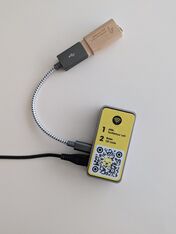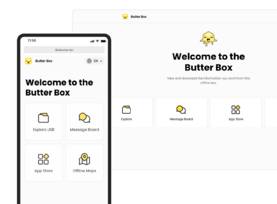July 25 2024 GM
From TCU Wiki
Glitter Meetup: Butter Box - Life Without Internet Made Smoother
| Glitter Meetups |
- Date: Thursday, July 25
- Time: 9am EDT / 1pm UTC
- Who: Carrie and John
- Facilitator: Mardiya
- Where: On TCU Mattermost "IF Square" Channel.
- Don't have an account to the TCU Mattermost? you can request one following the directions here.
Join us on July 25, to hear from Fabiola and Tiffany, currently the Project Manager and the UX Researcher of Butter Box project. The Guardian Project team will be sharing their work on the Butter ecosystem, designed to provide tools and services to people with limited or no access to the Internet.
What is Glitter Meetup?
Glitter Meetup is the weekly town hall of the digital rights and Internet Freedom community at the IF Square on the TCU Mattermost, at 9am EDT / 1pm UTC. It is a text-based chat where digital rights defenders can share regional and project updates, expertise, ask questions, and connect with others from all over the world! Do you need an invite? Learn how to get one here.
Notes

Why is it called Butter?
- In the early stages of concept and tech development we were promoting our ideas for offline tools on the butter website: https://likebutter.app/
- Butter is smooth. And our aim was not to solve every problem people have when they are without internet. But, it was to make their life a little better. A little 'smoother' (in the ways that we could unlock through the tech we're building).
- Most of our recent work has been on the Butter Boxes (https://likebutter.app/box/). Within it—in the app store feature—you'll find the Butter Collection, a set of apps that use less battery and internet. The idea of the Butter Collection and distribution of apps offline was the origin of the idea that we were working with when we branded it as Butter!
Can you break down what ‘butter box’ is and what does?
- Butter Box is an ecosystem of physical and digital tools curated to provide services and access to information to people experiencing internet shutdowns, and limited or no access to the internet due to natural disasters, or geographical or financial limitations.
- The Butter Box is a mini computer (a Raspberry Pi) that works as a Hotspot allowing nearby people to connect and have access to an offline, open-source app store based on F-Droid, a local public chat with encrypted private rooms, an offline navigation system with curated local maps, and curated information that can be shared using USB sticks connected to the box. Users connect to the WiFi network provided by the box to get access to the tools using a browser-based UI that works with any browser.
- Once connected to a box, you see the main portal dashboard:

So everyone on Butter has access to this public chat and encrypted private room? So they can talk to each other?
- Of course, you can decide which group of people to invite to your private rooms.
- A group of activists could be able to chat privately and securely even during shutdowns if they are able to reach the box physically. you can't (yet) use it to chat over long distances
What does long distance entail. For example across towns, cities or countries?
- It only works near the box, which has a normal wifi range of about 10m. Think of it more like a bulletin board. You don't need to be there at the same time, but you do have to pass through the same space
- This happens even if we individually have the box. Because if the box is office, it doesn't use the internet or other mmeans to relay messages over long distances.
How does butter box broadcast its own wifi? Does it rely on telecom networks? If so, how does it bypass shutdowns when those networks are down?
- No telecom networks required! It broadcasts wifi similarly to a router. The Butter Box is a Raspberry Pi computer with WiFi capabilities which means that it doesn’t rely on a telecom network, this also means the reach and number of users that can connect at the same time is limited, but we have been experimenting with different antennas and OpenWRT routers to increase those capabilities.
Has it been formally rolled out? do you know if groups are using butter box?
- We have groups that are using it in central america, south america, africa, and asia.
- Over the last year of development, we've worked closely with these partners to learn about their needs and how they want to use the box.
How are they using it if you don't mind sharing? Like an example of a use case? Or were there particular use cases you envisioned for communities? Which communities did you see using or needing butterbox the most?
- One thing to highlight is that Butter Box works great for information distribution for people in close range (ie. In the same space or room). For example, our partners at DSA have used Butter Boxes during digital security trainings to share training materials and software.
Can you tell us more about its development? For example, what use cases guided its development? Lessons learned/changes from prototypes? how it was tested, etc.
- Many folks are excited about the USB feature because it gives them the ability to organize and share any content they want. We've had partners use it in classroom settings to share cultural videos (from a USB drive); then to share homework through the chat.
- It's been really fun getting it in people's hands and seeing what they do with it. We originally designed it for post-disaster use, then expanded to try to cover use cases like protests and government shutdowns. But it's been fun to see people bring it to trainings and use it for whatever fits their communities.
Is there an option to build your own butter boxes with raspberry pi, first maybe explain what raspberry pi is, and how one can build their own using raspberry pi. Would they need specific capacitation from the guardian project? How can the community partner with you on accessing butter boxes?
- There absolutely is! If you've already got a raspberry pi set up (zero w 2, or pi 4), you can get everything you need from our website.
Can you folks talk a little bit about ways in which the system can be abused? For example, What threat models guided its development? Was there any security tests, etc? How can one responsibly disclose any vulnerability?
- Our contact info is on the site and we very much welcome any vulnerability reports!
- The security model is an interesting one, and something we're still working on. Because these are deployed in the wild with varying supervision, there's a risk of physical access and "evil twin" attacks. These make most practical attacks pretty easy for a motivated, resourced attacker with physical access.
- Some aspects of the box, like matrix-based chat, are pretty well hardened and we count on those constituent projects for many of the security qualities. We're also planning to implement SSL on the boxes to help with authenticity and encrypting client connections
Would you bring a prototype of butter box to the Global Gathering?
- We'll send at least a few. And maybe some solar panels to run them off of. (Where there's no internet, there's frequently no power!)